大学英语教案模板
- 格式:doc
- 大小:31.50 KB
- 文档页数:2
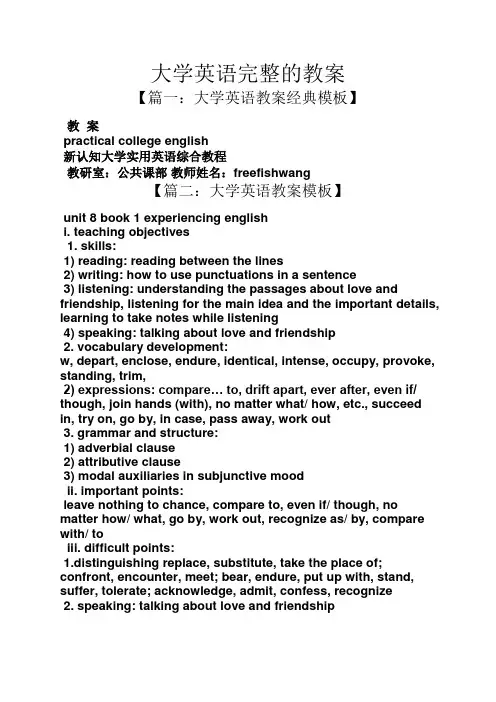
大学英语完整的教案【篇一:大学英语教案经典模板】教案practical college english新认知大学实用英语综合教程教研室:公共课部教师姓名:freefishwang【篇二:大学英语教案模板】unit 8 book 1 experiencing englishi. teaching objectives1. skills:1) reading: reading between the lines2) writing: how to use punctuations in a sentence3) listening: understanding the passages about love and friendship, listening for the main idea and the important details, learning to take notes while listening4) speaking: talking about love and friendship2. vocabulary development:w, depart, enclose, endure, identical, intense, occupy, provoke, standing, trim,2) expressions: compare… to, drift apart, ever after, even if/ though, join hands (with), no matter what/ how, etc., succeed in, try on, go by, in case, pass away, work out3. grammar and structure:1) adverbial clause2) attributive clause3) modal auxiliaries in subjunctive moodii. important points:leave nothing to chance, compare to, even if/ though, no matter how/ what, go by, work out, recognize as/ by, compare with/ toiii. difficult points:1.distinguishing replace, substitute, take the place of; confront, encounter, meet; bear, endure, put up with, stand, suffer, tolerate; acknowledge, admit, confess, recognize2. speaking: talking about love and friendship3. listening: understanding the passages, listening for the main idea and the important details, learning to take notes while listeningiv. teaching arrangements:1. total class time for this unit: 8 periods2. suggested arrangement:1) talking:(duty report, group discussion, free talk etc.) 402) pre-reading activities: 15-203) understanding the structure of text a: 15-204) detailed study of the language:1005) writing skills: 156) text summary 10’7) exercises: 558) reading skills: 15-259) detailed study of of text b: 60-7010) comprehensive exercises: 20iv. lecture scripts:(by the teachers)【篇三:新视野大学英语读写2(第三版)完整教案】新视野大学英语读写教程(第三版)book 2 教案。
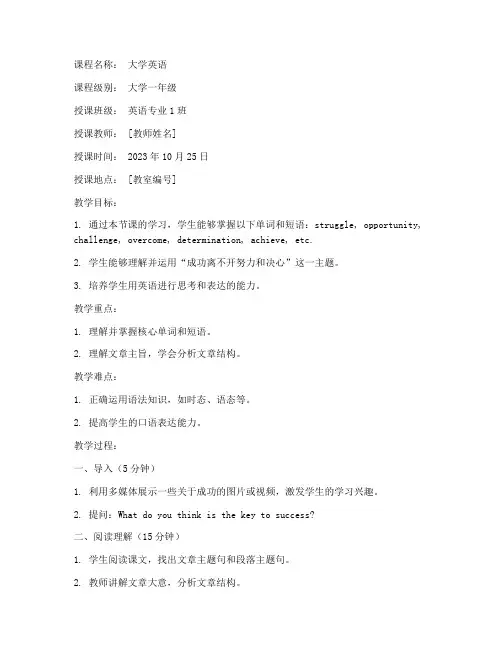
课程名称:大学英语课程级别:大学一年级授课班级:英语专业1班授课教师: [教师姓名]授课时间: 2023年10月25日授课地点: [教室编号]教学目标:1. 通过本节课的学习,学生能够掌握以下单词和短语:struggle, opportunity, challenge, overcome, determination, achieve, etc.2. 学生能够理解并运用“成功离不开努力和决心”这一主题。
3. 培养学生用英语进行思考和表达的能力。
教学重点:1. 理解并掌握核心单词和短语。
2. 理解文章主旨,学会分析文章结构。
教学难点:1. 正确运用语法知识,如时态、语态等。
2. 提高学生的口语表达能力。
教学过程:一、导入(5分钟)1. 利用多媒体展示一些关于成功的图片或视频,激发学生的学习兴趣。
2. 提问:What do you think is the key to success?二、阅读理解(15分钟)1. 学生阅读课文,找出文章主题句和段落主题句。
2. 教师讲解文章大意,分析文章结构。
三、词汇学习(15分钟)1. 教师带领学生学习核心单词和短语,如struggle, opportunity, challenge, overcome, determination, achieve等。
2. 学生通过例句学习和运用这些单词和短语。
四、语法讲解(10分钟)1. 教师讲解与课文相关的语法知识,如现在完成时、过去完成时等。
2. 学生进行相关练习。
五、口语练习(10分钟)1. 学生分组进行口语练习,用英语讨论如何实现自己的目标。
2. 教师巡回指导,纠正学生的发音和语法错误。
六、总结与作业(5分钟)1. 教师总结本节课的重点内容,强调成功的重要性。
2. 布置作业:写一篇关于成功的短文,字数不少于200字。
教学反思:1. 本节课通过多种教学方法,如多媒体展示、小组讨论等,提高了学生的学习兴趣。
2. 教师注重学生的口语表达能力,鼓励学生积极参与课堂活动。
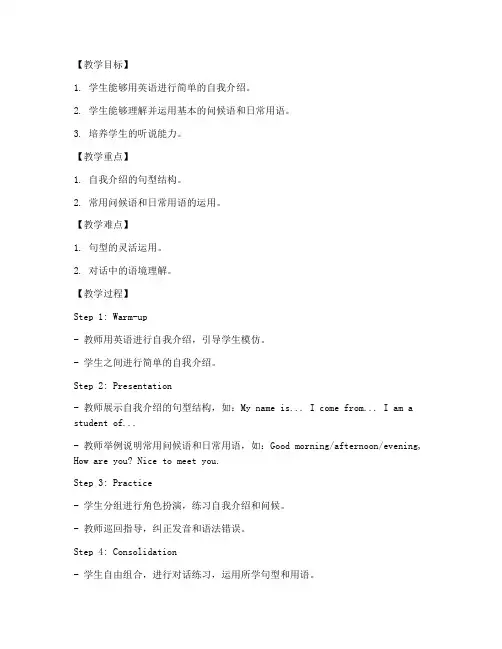
【教学目标】1. 学生能够用英语进行简单的自我介绍。
2. 学生能够理解并运用基本的问候语和日常用语。
3. 培养学生的听说能力。
【教学重点】1. 自我介绍的句型结构。
2. 常用问候语和日常用语的运用。
【教学难点】1. 句型的灵活运用。
2. 对话中的语境理解。
【教学过程】Step 1: Warm-up- 教师用英语进行自我介绍,引导学生模仿。
- 学生之间进行简单的自我介绍。
Step 2: Presentation- 教师展示自我介绍的句型结构,如:My name is... I come from... I am a student of...- 教师举例说明常用问候语和日常用语,如:Good morning/afternoon/evening, How are you? Nice to meet you.Step 3: Practice- 学生分组进行角色扮演,练习自我介绍和问候。
- 教师巡回指导,纠正发音和语法错误。
Step 4: Consolidation- 学生自由组合,进行对话练习,运用所学句型和用语。
- 教师选取优秀对话进行展示,给予点评。
Step 5: Homework- 学生回家后,用英语写一篇简短的自我介绍。
- 课后复习常用问候语和日常用语。
教案二:Unit 2 Daily Life【教学目标】1. 学生能够用英语描述日常生活。
2. 学生能够理解并运用与日常生活相关的词汇和句型。
3. 培养学生的听力和口语能力。
【教学重点】1. 描述日常生活的句型结构。
2. 与日常生活相关的词汇和句型。
【教学难点】1. 句型的灵活运用。
2. 对话中的语境理解。
【教学过程】Step 1: Warm-up- 教师提问学生关于日常生活的常见话题,如:What do you usually do in the morning? What is your favorite food?- 学生回答问题,复习相关词汇。
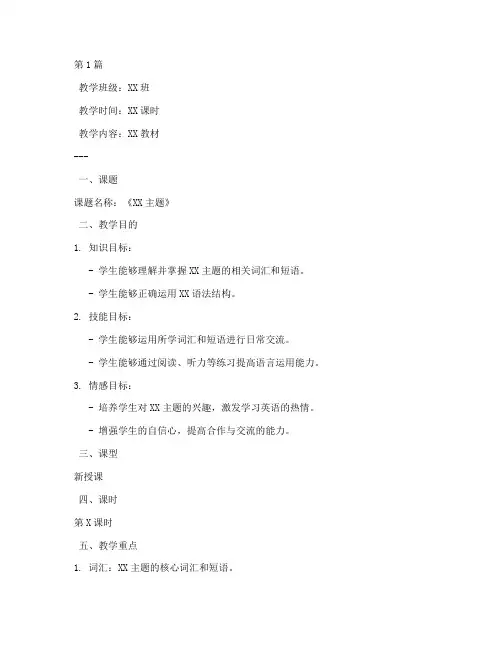
第1篇教学班级:XX班教学时间:XX课时教学内容:XX教材---一、课题课题名称:《XX主题》二、教学目的1. 知识目标:- 学生能够理解并掌握XX主题的相关词汇和短语。
- 学生能够正确运用XX语法结构。
2. 技能目标:- 学生能够运用所学词汇和短语进行日常交流。
- 学生能够通过阅读、听力等练习提高语言运用能力。
3. 情感目标:- 培养学生对XX主题的兴趣,激发学习英语的热情。
- 增强学生的自信心,提高合作与交流的能力。
三、课型新授课四、课时第X课时五、教学重点1. 词汇:XX主题的核心词汇和短语。
2. 语法:XX语法结构的运用。
六、教学难点1. 词汇的灵活运用。
2. 语法结构的准确掌握和运用。
七、教学过程(一)导入新课(5分钟)1. 热身活动:- 通过歌曲、游戏等方式激发学生的学习兴趣。
- 提问与XX主题相关的问题,引导学生回顾已学知识。
2. 导入新课:- 简要介绍XX主题的背景和重要性。
- 通过图片、视频等直观材料展示主题内容。
(二)讲授新课(15分钟)1. 词汇讲解:- 以小组讨论的形式,让学生分享与XX主题相关的词汇。
- 教师总结并讲解重点词汇和短语。
2. 语法讲解:- 结合实例,讲解XX语法结构的用法。
- 学生跟读并练习,教师及时纠正错误。
(三)巩固练习(10分钟)1. 听写练习:- 学生听录音,将听到的句子写在纸上。
- 教师检查并纠正错误。
2. 阅读练习:- 学生阅读课文,回答相关问题。
- 教师点评并总结。
(四)课堂活动(10分钟)1. 小组讨论:- 学生分组讨论XX主题的相关问题。
- 各小组汇报讨论结果。
2. 角色扮演:- 学生分组进行角色扮演,运用所学知识进行对话。
(五)归纳小结(5分钟)1. 回顾所学:- 教师引导学生回顾本节课所学内容。
2. 布置作业:- 布置与XX主题相关的课后作业。
八、板书设计1. XX主题词汇2. XX语法结构九、教具1. 多媒体设备2. 录音机3. 课本4. 图片、视频等辅助材料十、教学反思1. 教学过程中遇到的问题及解决方法。
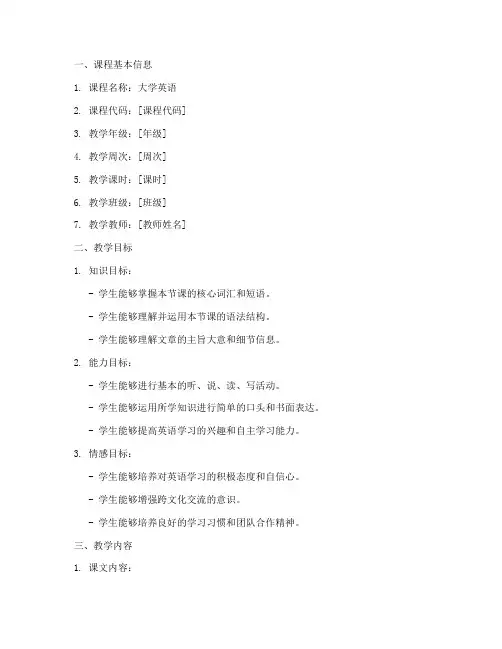
一、课程基本信息1. 课程名称:大学英语2. 课程代码:[课程代码]3. 教学年级:[年级]4. 教学周次:[周次]5. 教学课时:[课时]6. 教学班级:[班级]7. 教学教师:[教师姓名]二、教学目标1. 知识目标:- 学生能够掌握本节课的核心词汇和短语。
- 学生能够理解并运用本节课的语法结构。
- 学生能够理解文章的主旨大意和细节信息。
2. 能力目标:- 学生能够进行基本的听、说、读、写活动。
- 学生能够运用所学知识进行简单的口头和书面表达。
- 学生能够提高英语学习的兴趣和自主学习能力。
3. 情感目标:- 学生能够培养对英语学习的积极态度和自信心。
- 学生能够增强跨文化交流的意识。
- 学生能够培养良好的学习习惯和团队合作精神。
三、教学内容1. 课文内容:- 课文标题:[课文标题]- 课文来源:[教材或参考书名]- 课文类型:[如:记叙文、议论文、说明文等]2. 课文分析:- 主题思想:[课文所表达的中心思想]- 人物分析:[主要人物的性格特点、行为动机等]- 修辞手法:[使用的修辞手法及效果]四、教学步骤1. 导入(5分钟)- 复习上一节课的内容,激活学生已有知识。
- 通过图片、视频或问题引入新课主题。
2. 预读(10分钟)- 学生快速阅读课文,了解文章大意。
- 教师提问,检查学生对文章的整体理解。
3.精读(30分钟)- 词汇讲解:讲解课文中的重点词汇和短语。
- 语法讲解:讲解课文中的语法点。
- 句子分析:分析课文中的典型句子结构。
- 阅读理解:进行课文细节理解和主旨大意分析。
4. 课堂活动(20分钟)- 小组讨论:分组讨论课文内容,培养学生的合作能力。
- 角色扮演:通过角色扮演活动,提高学生的口语表达能力。
- 语法练习:进行语法练习,巩固所学语法知识。
5. 总结(5分钟)- 教师总结本节课的重点内容。
- 学生回顾所学知识,提出疑问。
6. 作业布置(5分钟)- 布置课后阅读、写作、口语练习等作业。
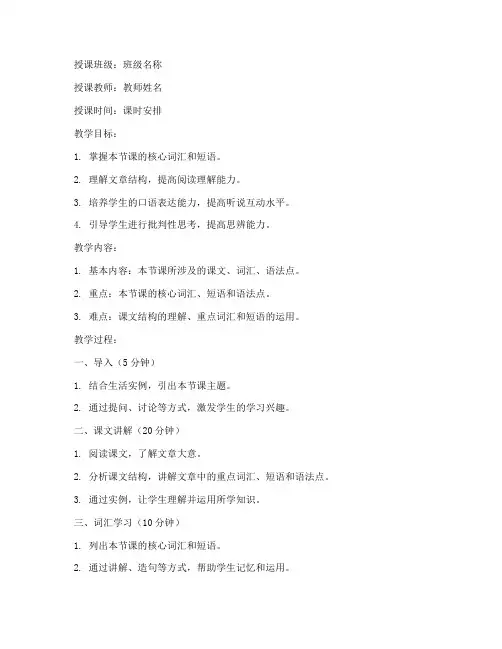
授课班级:班级名称授课教师:教师姓名授课时间:课时安排教学目标:1. 掌握本节课的核心词汇和短语。
2. 理解文章结构,提高阅读理解能力。
3. 培养学生的口语表达能力,提高听说互动水平。
4. 引导学生进行批判性思考,提高思辨能力。
教学内容:1. 基本内容:本节课所涉及的课文、词汇、语法点。
2. 重点:本节课的核心词汇、短语和语法点。
3. 难点:课文结构的理解、重点词汇和短语的运用。
教学过程:一、导入(5分钟)1. 结合生活实例,引出本节课主题。
2. 通过提问、讨论等方式,激发学生的学习兴趣。
二、课文讲解(20分钟)1. 阅读课文,了解文章大意。
2. 分析课文结构,讲解文章中的重点词汇、短语和语法点。
3. 通过实例,让学生理解并运用所学知识。
三、词汇学习(10分钟)1. 列出本节课的核心词汇和短语。
2. 通过讲解、造句等方式,帮助学生记忆和运用。
四、语法讲解(10分钟)1. 分析本节课的语法点,讲解其用法。
2. 通过实例,让学生理解并运用所学语法知识。
五、口语练习(10分钟)1. 设计与课文内容相关的口语练习题。
2. 组织学生进行小组讨论、角色扮演等活动,提高口语表达能力。
六、听说互动(10分钟)1. 设计与课文内容相关的听力材料。
2. 组织学生进行听力练习,并讨论听力材料中的重点内容。
七、总结与作业布置(5分钟)1. 总结本节课所学内容,强调重点。
2. 布置课后作业,巩固所学知识。
教学评价:1. 课堂参与度:观察学生在课堂上的发言、互动情况。
2. 作业完成情况:检查学生的课后作业,了解学生对本节课内容的掌握程度。
3. 考试成绩:通过平时成绩和期末考试成绩,评估学生对本节课内容的掌握程度。
教学反思:1. 根据学生的反馈,调整教学内容和方法。
2. 总结教学经验,不断提高教学水平。
教案注意事项:1. 注重激发学生的学习兴趣,提高课堂氛围。
2. 结合生活实例,让学生更好地理解和运用所学知识。
3. 注重学生的个体差异,因材施教。
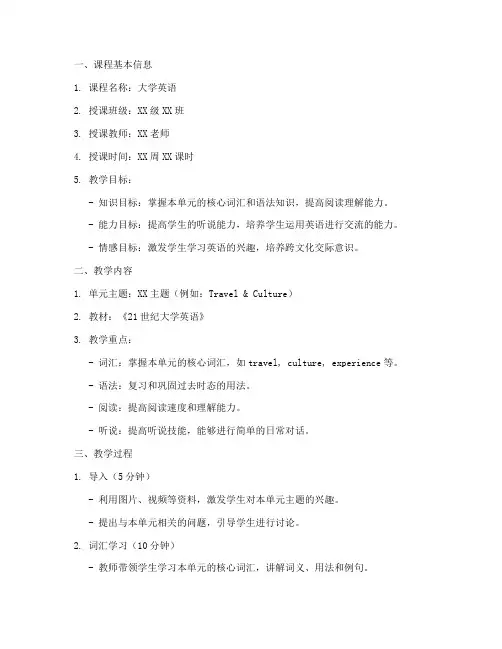
一、课程基本信息1. 课程名称:大学英语2. 授课班级:XX级XX班3. 授课教师:XX老师4. 授课时间:XX周XX课时5. 教学目标:- 知识目标:掌握本单元的核心词汇和语法知识,提高阅读理解能力。
- 能力目标:提高学生的听说能力,培养学生运用英语进行交流的能力。
- 情感目标:激发学生学习英语的兴趣,培养跨文化交际意识。
二、教学内容1. 单元主题:XX主题(例如:Travel & Culture)2. 教材:《21世纪大学英语》3. 教学重点:- 词汇:掌握本单元的核心词汇,如travel, culture, experience等。
- 语法:复习和巩固过去时态的用法。
- 阅读:提高阅读速度和理解能力。
- 听说:提高听说技能,能够进行简单的日常对话。
三、教学过程1. 导入(5分钟)- 利用图片、视频等资料,激发学生对本单元主题的兴趣。
- 提出与本单元相关的问题,引导学生进行讨论。
2. 词汇学习(10分钟)- 教师带领学生学习本单元的核心词汇,讲解词义、用法和例句。
- 学生通过小组活动,运用所学词汇进行造句。
3. 语法讲解(10分钟)- 教师讲解过去时态的用法,并通过例句进行巩固。
- 学生进行语法练习,巩固所学知识。
4. 阅读理解(15分钟)- 学生阅读课文,完成课后练习题。
- 教师对练习题进行讲解,帮助学生理解课文内容。
5. 听说训练(15分钟)- 学生进行小组讨论,运用所学词汇和语法进行对话。
- 教师进行点评和指导。
6. 课堂小结(5分钟)- 教师对本节课的内容进行总结,强调重点和难点。
- 学生进行自我评价,反思自己的学习情况。
四、课后作业1. 完成课后练习题。
2. 复习本单元的词汇和语法知识。
3. 预习下一单元的内容。
五、教学反思1. 教师在教学过程中,要注意激发学生的学习兴趣,引导学生积极参与课堂活动。
2. 教师要根据学生的实际情况,调整教学进度和教学方法。
3. 教师要注重培养学生的听说能力,提高学生的英语交际能力。
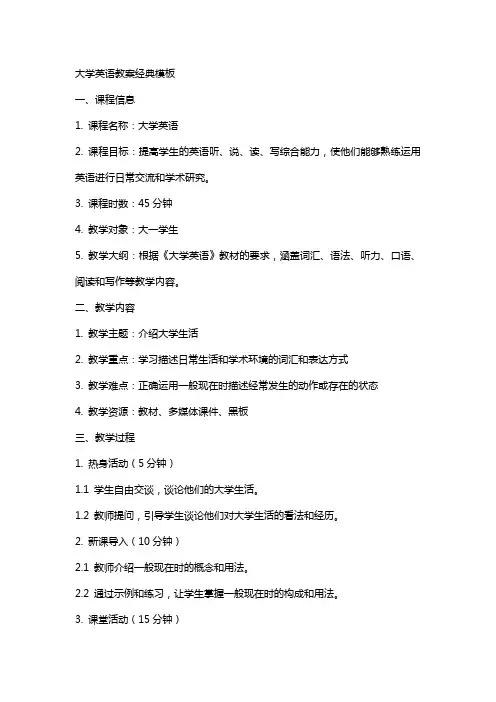
大学英语教案经典模板一、课程信息1. 课程名称:大学英语2. 课程目标:提高学生的英语听、说、读、写综合能力,使他们能够熟练运用英语进行日常交流和学术研究。
3. 课程时数:45分钟4. 教学对象:大一学生5. 教学大纲:根据《大学英语》教材的要求,涵盖词汇、语法、听力、口语、阅读和写作等教学内容。
二、教学内容1. 教学主题:介绍大学生活2. 教学重点:学习描述日常生活和学术环境的词汇和表达方式3. 教学难点:正确运用一般现在时描述经常发生的动作或存在的状态4. 教学资源:教材、多媒体课件、黑板三、教学过程1. 热身活动(5分钟)1.1 学生自由交谈,谈论他们的大学生活。
1.2 教师提问,引导学生谈论他们对大学生活的看法和经历。
2. 新课导入(10分钟)2.1 教师介绍一般现在时的概念和用法。
2.2 通过示例和练习,让学生掌握一般现在时的构成和用法。
3. 课堂活动(15分钟)3.1 分组活动:学生分组,每组选择一个主题(如家庭、学校、兴趣爱好等),用一般现在时描述。
3.2 学生展示:每组轮流上台展示他们的描述,其他学生倾听并给予反馈。
4. 巩固练习(5分钟)4.1 学生完成课后练习题,巩固一般现在时的用法。
4.2 教师批改练习,给予学生个别辅导。
四、课后作业1. 完成课后练习题,巩固本节课所学内容。
2. 写一篇短文,描述自己的日常生活和学术环境,尽量使用一般现在时。
五、教学反思1. 教师在课后对自己的教学进行反思,总结教学中的优点和不足。
2. 根据学生的课堂表现和作业完成情况,调整教学方法和策略,以提高教学效果。
3. 针对学生的学习需求,制定下一步的教学计划,确保学生能够掌握英语听、说、读、写综合能力。
六、教学评估1. 课堂参与度:观察学生在课堂活动中的参与程度,了解他们对一般现在时的掌握情况。
2. 作业完成情况:批改学生的课后作业,评估他们对一般现在时的运用能力和写作水平。
3. 小组讨论:评估学生在小组讨论中的表现,了解他们能否主动运用英语进行交流和表达。
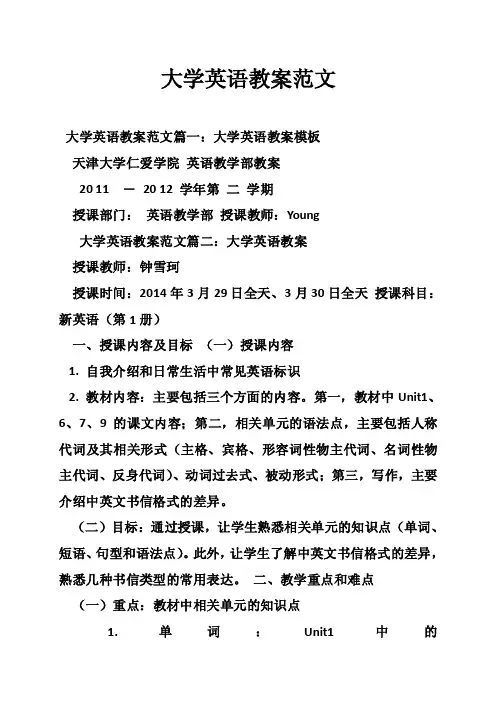
大学英语教案范文大学英语教案范文篇一:大学英语教案模板天津大学仁爱学院英语教学部教案20 11 -20 12 学年第二学期授课部门:英语教学部授课教师:Young大学英语教案范文篇二:大学英语教案授课教师:钟雪珂授课时间:2014年3月29日全天、3月30日全天授课科目:新英语(第1册)一、授课内容及目标(一)授课内容1. 自我介绍和日常生活中常见英语标识2. 教材内容:主要包括三个方面的内容。
第一,教材中Unit1、6、7、9的课文内容;第二,相关单元的语法点,主要包括人称代词及其相关形式(主格、宾格、形容词性物主代词、名词性物主代词、反身代词)、动词过去式、被动形式;第三,写作,主要介绍中英文书信格式的差异。
(二)目标:通过授课,让学生熟悉相关单元的知识点(单词、短语、句型和语法点)。
此外,让学生了解中英文书信格式的差异,熟悉几种书信类型的常用表达。
二、教学重点和难点(一)重点:教材中相关单元的知识点1. 单词:Unit1中的introduce/tip/enter/confident/contact/nickname/host/enjoy;Unit 6中的problem/difficulty/order/experience/restaurant/pleasant;Unit7中的purpose/aim/consideration/simply/complete/suit/bargain;Unit 9中的tip/ waiter/ barber/ wage/ earn/ decent/ absolute/ vary/ customs。
2. 短语和句型:Unit1 中的introduce oneself/ have…in common/ lead to/ have a good time/ It is +形容词+ to do sth.;Unit 6 中的have difficulty in doing sth./ask for/have a holiday; Unit 7中的go shopping/ in advance/ be based on/ make up one’s mind/ try on/face with;Unit 9 中的make up/ earn a living。
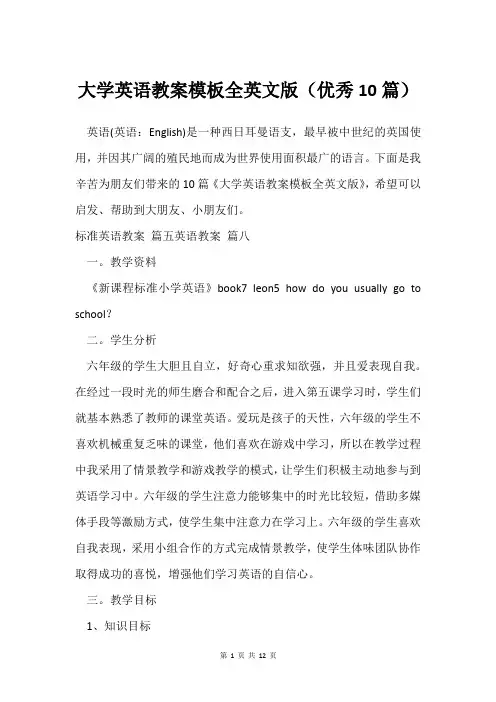
大学英语教案模板全英文版(优秀10篇)英语(英语:English)是一种西日耳曼语支,最早被中世纪的英国使用,并因其广阔的殖民地而成为世界使用面积最广的语言。
下面是我辛苦为朋友们带来的10篇《大学英语教案模板全英文版》,希望可以启发、帮助到大朋友、小朋友们。
标准英语教案篇五英语教案篇八一。
教学资料《新课程标准小学英语》book7 leon5 how do you usually go to school?二。
学生分析六年级的学生大胆且自立,好奇心重求知欲强,并且爱表现自我。
在经过一段时光的师生磨合和配合之后,进入第五课学习时,学生们就基本熟悉了教师的课堂英语。
爱玩是孩子的天性,六年级的学生不喜欢机械重复乏味的课堂,他们喜欢在游戏中学习,所以在教学过程中我采用了情景教学和游戏教学的模式,让学生们积极主动地参与到英语学习中。
六年级的学生注意力能够集中的时光比较短,借助多媒体手段等激励方式,使学生集中注意力在学习上。
六年级的学生喜欢自我表现,采用小组合作的方式完成情景教学,使学生体味团队协作取得成功的喜悦,增强他们学习英语的自信心。
三。
教学目标1、知识目标a.使学生能熟记bus,car,train,on foot新词汇b.使学生能熟记用句子how do you usually go to school?i usually go to school by…?进行对话2、本事目标使学生能把学到的知识运用到实际生活中去3、情感目标培养学生的自我表达本事和团队合作精神四。
教学重点与难点1、熟记所学新单词,做到发音准确,拼写正确2、能过把新单词运用到句型i usually go to school by……?五。
教学方法情景教学法与游戏教学法相结合六。
学习方法自主学习与小组合作相结合七。
课前准备单词卡片、短语卡片、幻灯片等八。
教学过程1、新课导入首先全班同学起立合唱leon3中的歌曲where do you e from?吸引学生注意力到课堂学习中,同时营造一个良好的英语学习氛围,为新课学习做准备。
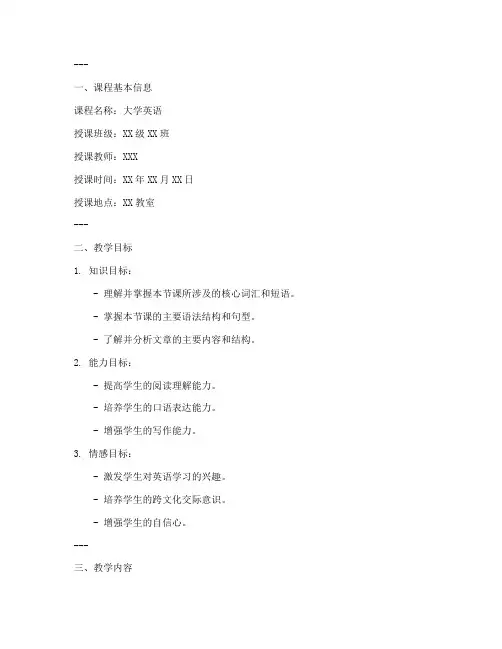
---一、课程基本信息课程名称:大学英语授课班级:XX级XX班授课教师:XXX授课时间:XX年XX月XX日授课地点:XX教室---二、教学目标1. 知识目标:- 理解并掌握本节课所涉及的核心词汇和短语。
- 掌握本节课的主要语法结构和句型。
- 了解并分析文章的主要内容和结构。
2. 能力目标:- 提高学生的阅读理解能力。
- 培养学生的口语表达能力。
- 增强学生的写作能力。
3. 情感目标:- 激发学生对英语学习的兴趣。
- 培养学生的跨文化交际意识。
- 增强学生的自信心。
---三、教学内容1. 课文内容:- 本文节选自XX教材XX单元,主题为XX。
2. 重点词汇:- XX、XX、XX3. 语法结构:- XX、XX4. 句型:- XX、XX---四、教学过程1. 导入(5分钟)- 利用图片、视频等教学资源,引入本节课的主题。
- 提问:What do you think about XX?- 引导学生进行自由讨论,激发学生的兴趣。
2. 课文讲解(20分钟)- 朗读课文,并让学生跟读。
- 分析课文结构,讲解重点词汇和短语。
- 分析语法结构和句型,并进行举例说明。
- 引导学生进行课文翻译和复述。
3. 口语练习(15分钟)- 设置情景,让学生进行口语对话。
- 鼓励学生用所学词汇和句型进行表达。
- 针对学生的发音、语法等方面进行指导和纠正。
4. 写作练习(10分钟)- 针对课文主题,布置写作任务。
- 引导学生进行写作思路的梳理。
- 对学生的写作进行点评和指导。
5. 总结(5分钟)- 回顾本节课所学内容,强调重点。
- 鼓励学生在课后进行复习和巩固。
---五、教学手段1. 多媒体课件2. 教学视频3. 教学图片4. 练习题---六、教学反思本节课通过多种教学手段,激发了学生的学习兴趣,提高了学生的英语综合运用能力。
在教学过程中,要注意以下几点:1. 注重学生的主体地位,鼓励学生积极参与课堂活动。
2. 适当调整教学节奏,确保学生能够跟上教学进度。
---Course Title: [Course Name]Course Code: [Course Code]Department: [Department Name]Instructor: [Instructor's Name]Semester: [Semester and Year]Class Hours: [Total Hours per Week]Course Description:[Provide a brief description of the course, including its objectives, content, and expected learning outcomes.]---Week 1: Introduction to the CourseObjective:- Familiarize students with the course structure, expectations, and assessment criteria.- Develop basic communication skills in English.Activities:1. Icebreaker Activity:- Students introduce themselves in English, sharing their names, majors, and reasons for taking the course.- The instructor asks a few simple questions to encourage interaction and get to know the students.2. Course Overview:- The instructor provides an overview of the course, including the syllabus, learning objectives, and assessment methods.- Highlight key topics and themes that will be covered throughout the semester.3. Classroom Rules and Expectations:- Discuss and establish classroom rules, including participation, punctuality, and academic integrity.- Explain the importance of active participation and the benefits of engaging with the material.4. Assessment Overview:- Outline the types of assessments (e.g., quizzes, exams, presentations, projects) and their respective weights.- Provide a clear grading scale and explain how grades will be calculated.Materials:- Syllabus- Handout with course overview- Whiteboard and markersHomework:- Read the assigned textbook chapters for the first week.- Prepare a short presentation on a topic of interest related to the course.---Week 2: Basic Grammar and VocabularyObjective:- Introduce students to fundamental grammar concepts and vocabulary relevant to the course.- Develop basic reading and writing skills in English.Activities:1. Grammar Presentation:- The instructor presents a lesson on a basic grammar topic (e.g., present tense, simple past tense).- Use visual aids and examples to illustrate the concept.2. Vocabulary Exercises:- Students complete vocabulary exercises to reinforce the new terms and concepts introduced in the lesson.- Engage in a group activity to practice using the new vocabulary in context.3. Reading and Writing Practice:- Students read a short passage and answer comprehension questions.- Write a short paragraph using the new grammar and vocabulary.Materials:- Grammar handout- Vocabulary list- Textbook or reading passage- Writing paperHomework:- Complete the grammar and vocabulary exercises provided in class.- Write a paragraph using the new grammar and vocabulary.---Week 3: Listening and Speaking SkillsObjective:- Develop listening and speaking skills necessary for academic and social contexts.- Familiarize students with different accents and speaking styles.Activities:1. Listening Activity:- Students listen to a recorded passage or audio clip and answer comprehension questions.- Discuss the content and vocabulary used in the recording.2. Role-Playing:- Students engage in role-playing exercises to practice speaking in English.- The instructor provides feedback and suggestions for improvement.3. Group Discussion:- Students participate in a group discussion on a given topic.- Encourage active listening and clear, concise speaking.Materials:- Audio clips or videos- Handout with discussion questions- Group activity guideHomework:- Listen to the assigned audio clip or video and take notes.- Prepare a short presentation on the topic of the group discussion.---Continuation of Activities and Objectives:Each subsequent week will build upon the skills。
课程名称:大学英语综合课程授课班级:英语专业一年级授课教师: [教师姓名]授课时间:第1周星期X 下午X节教学目标:1. 知识目标:掌握本节课的核心词汇和语法点,提高学生的词汇量和语法应用能力。
2. 能力目标:通过听说读写练习,提高学生的英语综合运用能力。
3. 情感目标:激发学生学习英语的兴趣,培养良好的学习习惯和团队合作精神。
教学内容:1. 课文内容:选取大学英语教材中的某一篇课文。
2. 词汇:本节课需要掌握的词汇和短语。
3. 语法:本节课需要学习的语法点。
4. 阅读理解:提高学生的阅读理解能力。
5. 听力理解:提高学生的听力理解能力。
6. 写作:训练学生的写作技巧。
教学重点:1. 课文内容的理解。
2. 词汇和短语的掌握。
3. 语法点的运用。
4. 听说读写技能的综合运用。
教学难点:1. 复杂语法点的理解和运用。
2. 阅读和听力理解中的长难句分析。
3. 写作中的逻辑结构和语言表达的准确性。
教学方法:1. 讲授法:教师讲解课文内容、词汇、语法点等。
2. 演示法:教师通过示范演示语法点和写作技巧。
3. 讨论法:组织学生进行小组讨论,提高学生的参与度和合作能力。
4. 练习法:通过大量的练习巩固所学知识。
教学过程:一、导入(5分钟)1. 教师简要介绍本节课的主题和内容。
2. 通过提问或小游戏激发学生的兴趣。
二、课文讲解(15分钟)1. 教师讲解课文内容,重点解释生词和难句。
2. 引导学生思考课文中的主题和观点。
三、词汇学习(10分钟)1. 教师讲解本节课的词汇和短语,并举例说明其用法。
2. 学生跟读并拼写词汇。
四、语法点讲解(10分钟)1. 教师讲解本节课的语法点,并通过例句进行演示。
2. 学生练习运用语法点进行句子构造。
五、阅读理解练习(10分钟)1. 学生阅读课文,完成阅读理解练习。
2. 教师讲解答案,并分析阅读技巧。
六、听力理解练习(10分钟)1. 学生听录音,完成听力理解练习。
2. 教师讲解答案,并分析听力技巧。
课程名称:《大学英语》授课班级:XX班授课教师:XX课时:2课时教学目标:1. 知识目标:掌握课文中的重点词汇和句型,提高英语阅读理解能力。
2. 能力目标:提高学生的口语表达能力,培养良好的口语交际习惯。
3. 情感目标:激发学生的学习兴趣,培养学生的团队合作精神。
教学重点:1. 课文中的重点词汇和句型。
2. 口语表达能力的提高。
教学难点:1. 课文中的复杂句型理解。
2. 口语表达的流畅性和准确性。
教学过程:第一课时一、导入1. 利用多媒体展示课文图片,激发学生的学习兴趣。
2. 提问:What do you see in the picture? 引导学生进行口语表达。
二、课文讲解1. 预习课文,让学生掌握课文中的重点词汇和句型。
2. 集体朗读课文,注意语音、语调的准确性。
3. 分析课文中的复杂句型,引导学生理解其含义。
4. 讲解课文中的文化背景知识,帮助学生更好地理解课文。
三、课堂练习1. 词汇练习:让学生用课文中的词汇造句,提高词汇运用能力。
2. 句型练习:让学生根据课文中的句型进行口语表达,提高口语表达能力。
四、课堂小结1. 总结本节课所学内容,强调重点词汇和句型。
2. 布置课后作业,巩固所学知识。
第二课时一、复习导入1. 回顾上一节课所学内容,检查学生对重点词汇和句型的掌握情况。
2. 提问:Do you remember the key words and sentence patterns in the last lesson? 引导学生进行口语表达。
二、口语练习1. 小组讨论:让学生围绕课文主题进行小组讨论,提高口语表达能力。
2. 角色扮演:让学生根据课文内容进行角色扮演,锻炼口语交际能力。
三、课堂展示1. 学生展示:让学生展示自己在本节课所学到的知识和技能。
2. 教师点评:对学生的展示进行点评,给予鼓励和指导。
四、课堂小结1. 总结本节课所学内容,强调口语表达能力的重要性。
2. 布置课后作业,巩固所学知识。
一、课程名称[课程名称]二、教学目标1. 知识目标:- 学生能够掌握[具体知识点]。
- 学生能够了解[具体知识点]的背景和应用。
2. 能力目标:- 学生能够运用[具体技能]进行[具体活动]。
- 学生能够通过[具体方法]提高[具体能力]。
3. 情感目标:- 学生能够对[课程主题]产生兴趣。
- 学生能够培养[特定品质],如团队合作、批判性思维等。
三、教学重点与难点1. 教学重点:- [具体知识点或技能]的讲解与演示。
- [具体活动或项目]的操作与实施。
2. 教学难点:- [具体知识点或技能]的理解与应用。
- [具体活动或项目]的复杂性与挑战性。
四、教学方法1. 讲授法:对[具体知识点]进行系统讲解。
2. 讨论法:引导学生对[课程主题]进行深入探讨。
3. 案例分析法:通过[具体案例]帮助学生理解[知识点]。
4. 角色扮演法:让学生在模拟环境中体验[特定情境]。
5. 实践操作法:通过[具体活动]让学生动手实践,提高技能。
五、教学过程1. 导入- 引入话题:简要介绍[课程主题]的背景和重要性。
- 引起兴趣:提出与[课程主题]相关的问题,激发学生的好奇心。
2. 讲解- 讲解[具体知识点]:详细讲解[知识点],结合实例说明。
- 展示[具体技能]:演示[技能]的操作步骤,讲解技巧和注意事项。
3. 讨论- 引导学生就[课程主题]展开讨论,分享观点和经验。
- 鼓励学生提出问题,共同解决问题。
4. 案例分析- 分析[具体案例],引导学生从中提炼[知识点]。
- 讨论案例中的决策过程和结果,培养学生的批判性思维。
5. 角色扮演- 分组进行角色扮演,让学生在模拟环境中体验[特定情境]。
- 引导学生分析角色扮演中的问题,并提出解决方案。
6. 实践操作- 学生分组进行[具体活动],动手实践,提高技能。
- 教师巡回指导,解答学生在操作过程中遇到的问题。
7. 总结- 总结[课程主题]的主要内容,强调重点和难点。
- 引导学生反思学习过程,提出改进意见。
---一、课程基本信息1. 课程名称:大学英语2. 授课班级:XX班3. 授课教师:[教师姓名]4. 授课时间:[具体日期]5. 课时安排:[课时数]---二、教学目标1. 知识目标:- 学生能够掌握本课所涉及的核心词汇和短语。
- 学生能够理解并运用本课所学的语法知识。
- 学生能够提高阅读理解能力,对文章内容进行准确的分析和总结。
2. 技能目标:- 学生能够进行基本的听说练习,提高口语表达能力。
- 学生能够通过小组讨论和合作,提高英语交流能力。
- 学生能够通过写作练习,提高英语写作技巧。
3. 情感目标:- 激发学生对英语学习的兴趣,培养良好的学习习惯。
- 增强学生的自信心,提高面对英语交流的勇气。
- 培养学生的跨文化交际意识。
---三、教学内容1. 课题:[具体课题名称]2. 课文:[课文标题]3. 教学重点:- [列出本课必须解决的关键性问题]- [强调重点词汇和短语]- [强调重点语法结构]4. 教学难点:- [分析本课学习时易产生困难和障碍的知识点]- [提出解决难点的策略和方法]---四、教学方法1. 启发式教学:通过提问、讨论等方式,引导学生主动思考和探索。
2. 任务型教学:设计具体的任务,让学生在完成任务的过程中学习和运用英语。
3. 多媒体教学:利用多媒体资源,如PPT、视频等,丰富教学内容,提高教学效果。
---五、教学过程1. 导入(5分钟):- 复习上节课内容。
- 通过游戏、歌曲等轻松的方式,激发学生的学习兴趣。
2. 新课导入(10分钟):- 阅读课文,引导学生了解文章大意。
- 提出问题,引导学生思考和讨论。
3. 词汇和语法讲解(15分钟):- 介绍本课重点词汇和短语。
- 讲解相关语法知识,并进行练习。
4. 听说练习(15分钟):- 进行听力练习,提高学生的听力理解能力。
- 进行口语练习,提高学生的口语表达能力。
5. 小组讨论(10分钟):- 将学生分成小组,讨论课文中的问题。
一、课程信息1. 课程名称:大学英语2. 教学班级:XX级XX班3. 教师姓名:XXX4. 教学时间:每周XX课时5. 教学进度:第XX周6. 教学目标:- 知识目标:掌握本单元的核心词汇和语法知识,提高英语阅读、写作、听力和口语能力。
- 能力目标:培养学生运用英语进行交际的能力,提高学生的综合素质。
- 情感目标:激发学生的学习兴趣,培养学生积极向上的学习态度。
二、教学内容1. 单元主题:XX2. 教学重点:- 词汇:掌握本单元的核心词汇,包括名词、动词、形容词、副词等。
- 语法:复习和巩固本单元的语法知识,如时态、语态、非谓语动词等。
- 听力:提高学生对英语听力材料的理解和捕捉关键信息的能力。
- 阅读:提高学生的英语阅读速度和理解能力,培养学生的阅读技巧。
- 写作:提高学生的英语写作能力,包括句子结构、段落组织、文章结构等。
- 口语:提高学生的英语口语表达能力,培养学生的口语交流技巧。
三、教学步骤1. 导入(5分钟)- 复习上节课所学内容,检查学生对知识的掌握情况。
- 通过提问、讨论等方式,激发学生对本节课主题的兴趣。
2. 词汇讲解(15分钟)- 介绍本单元的核心词汇,包括词性、词义、例句等。
- 通过游戏、练习等方式,帮助学生记忆和运用词汇。
3. 语法讲解(10分钟)- 复习和巩固本单元的语法知识,通过例句和练习,让学生掌握语法要点。
4. 听力训练(15分钟)- 播放听力材料,让学生听取并回答问题,提高听力理解能力。
- 分析听力材料,讲解听力技巧。
5. 阅读理解(15分钟)- 分组讨论阅读材料,分析文章结构和主旨大意。
- 提问和解答,检查学生对阅读材料的理解程度。
6. 写作指导(15分钟)- 分析写作要求,指导学生如何组织文章结构。
- 学生进行写作练习,教师个别指导。
7. 口语练习(10分钟)- 学生进行口语对话,练习口语表达技巧。
- 教师点评和纠正发音、语法等方面的错误。
8. 总结(5分钟)- 总结本节课所学内容,强调重点和难点。
Unit 8 Book 1 Experiencing English
I. Teaching objectives
1. Skills:
1) Reading: Reading Between the Lines
2) Writing: how to use punctuations in a sentence
3) Listening: understanding the passages about love and friendship, listening for the main idea and the important details, learning to take notes while listening
4) Speaking: talking about love and friendship
2. Vocabulary development:
1) Words: acquaintance, barely, encounter, incline, intimate, occasional, principle, recall, recognize, replace, summarize, upset, bow, depart, enclose, endure, identical, intense, occupy, provoke, standing, trim,
2) Expressions: compare…to, drift apart, ever after, even if/ though, join hands (with), no matter what/ how, etc., succeed in, try on, go by, in case, pass away, work out
3. Grammar and structure:
1) Adverbial clause
2) Attributive clause
3) modal auxiliaries in subjunctive mood
II. Important points:
Leave nothing to chance, compare to, even if/ though, no matter how/ what, go by, work out, recognize as/ by, compare with/ to
III. Difficult points:
1.distinguishing replace, substitute, take the place of; confront, encounter, meet; bear, endure, put up with, stand, suffer, tolerate; acknowledge, admit, confess, recognize
2. Speaking: talking about love and friendship
3. Listening: understanding the passages, listening for the main idea and the important details, learning to take notes while listening
IV. Teaching arrangements:
1. Total class time for this unit: 8 periods
2. Suggested arrangement:
1) Talking:(duty report, group discussion, free talk etc.) 40'
2) Pre-reading activities: 15-20'
3) Understanding the structure of text A: 15-20'
4) Detailed study of the language:100'
5) Writing skills: 15'
6) Text s ummary 10’
7) Exercises: 55'
8) Reading skills: 15-25'
9) Detailed study of of text B: 60-70'
10) Comprehensive exercises: 20' IV. Lecture scripts:(by the teachers)。